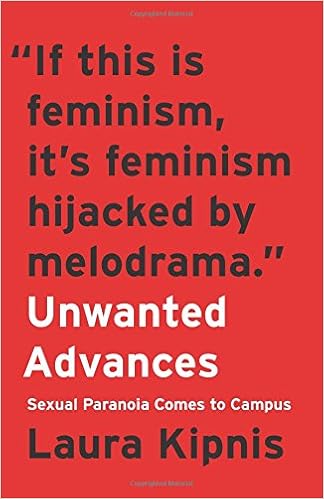I thought I'd write a few posts about Laura Kipnis's controversial book Unwanted Advances: Sexual Paranoia Comes to Campus. I listened to the audio version of the book, so can't go back and check passages. This will have to be a bit impressionistic.
Half the book is about several Title IX investigations that happen to involve philosophers. The other half is a general response to the way sexual behavior is currently constrained on college campuses, due to Title IX and campus policies. Today I'm going to write a bit about this second, general response.
Kipnis thinks Title IX intrudes too much on the messy business of sex and romance both between students and between students and faculty. She has a lot to say about how student-faculty relationships can lead to student-faculty marriages, and about how students are not simply exploited by powerful professors, but can be attracted to them. In fact, they can find their power and status attractive. Why is that always so terribly bad?
I suppose she's right that it's not always so terribly bad--in fact, in some cases not bad at all. And as a polemicist, she's within her rights to focus on cases where everyone lives happily ever after, or at least nobody's permanently scarred. But there are other sorts of cases. The ones everyone tends to focus are ones in which students are seriously harmed. I have had students confide in me about cases like this and could testify vividly to the harm--if these matters weren't confidential. But that's not what I actually want to talk about. What doesn't get discussed much is another problem with faculty pursuing students, besides the harm that's done to certain students. The problem involves the costs of avoidance.
At every stage of my schooling, I knew who the predatory professors were (and yes, that's how I saw them.) A married man twice or three times my age hitting on me? Eww. I avoided these people like the plague. That means there were professors I deliberately never took classes with, never worked with as a teaching assistant, and never accepted potentially career-advancing opportunities from. The male students in my midst had no such problem--they took classes with these guys, assisted them, worked with them. That's unacceptable, and not consistent with equal opportunity. There's a problem when female students have to skate around predatory male professors, so can't take advantage of all that a university has to offer.
I admit, I'm just one type of student--the avoider--and there are two others. There are women who are attracted, willingly involved, and not harmed in any real way. And there are women who get coerced and harmed by womanizing faculty. What bothers me about Kipnis is that of the three groups, she is only really focussed on the first--confident, fun-loving, risk-taking, adventurous women who can find graying high status professors powerful and hot (mirabile dictu, in the opinion of my 20 year old self!). She's right to say they exist, but wrong to focus so little on the second group, and not at all on the third. But I know there are women in the second, and also know there are women in the third.
To ensure equal access to education, Title IX investigators do have to be concerned with sexual behavior, but do they do their very important work fairly? Kipnis says no, and I find her very compelling on this topic. I think she's uncovered some travesties in the Ludlow investigation, even though Ludlow is probably just the kind of professor I would have avoided like the plague, when I was a student. Maybe I'll come back to that in a later post.


No comments:
Post a Comment